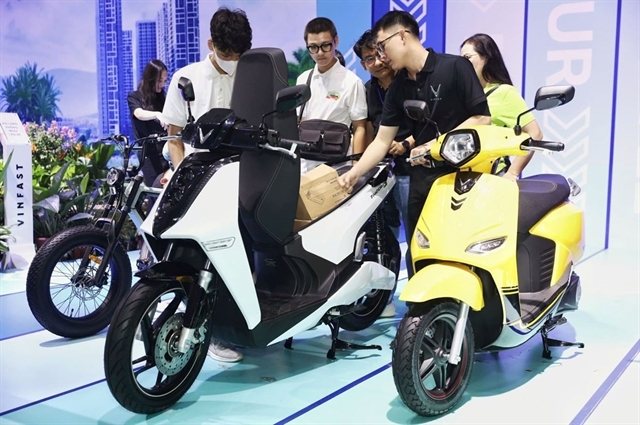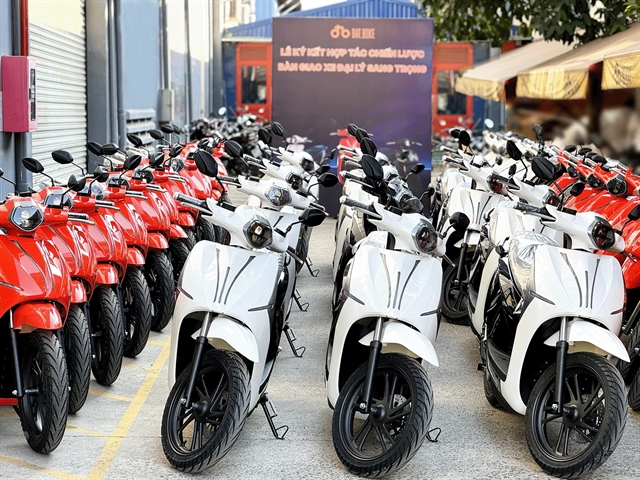 Economy
Economy


|
| Customers browsing VinFast electric motorbikes. — Photo thegioitiepthi.danviet.vn |
HÀ NỘI — The Prime Minister's directive to ban all petrol-powered motorbikes and mopeds from Hà Nội’s inner Ring Road 1 is being hailed as a significant catalyst for Việt Nam’s electric motorbike market.
Experts say the move could spark a sharp rise in demand, provided that charging infrastructure and battery-swapping services are scaled up to meet consumer needs.
Việt Nam’s electric motorbike market has seen a significant transformation in recent years, emerging as a dynamic landscape for both homegrown manufacturers and global industry players.
Preliminary data indicates that around 10 electric motorbike brands are now officially distributed in the country, including major names such as VinFast, Yadea, Pega, DatBike, Detech, Honda, Anbico, Osaka and DK Bike. In addition to these, numerous smaller brands and imported models — primarily from China — have made their way into the Vietnamese market via independent retail channels.
From budget to premium segments
The domestic electric motorbike market now caters to a broad spectrum of consumers, with prices ranging from affordable student-friendly models to high-performance premium options.
The budget segment, priced under VNĐ20 million (US$770), primarily features compact bikes with top speeds of 40-50km/h, ideal for students and short-distance commuters. Notable brands in this category include Anbico, Detech and DK Bike.
Meanwhile, the mid-range segment, priced between VNĐ20-35 million ($770-$1,350), currently dominates consumer demand. Popular models like VinFast Evo, Feliz, Yadea BuyE and Pega Aura come equipped with lithium batteries and offer a travel range of 70-100km per charge.
At the top end, the premium segment features models priced above VNĐ40 million ($1,540), with some reaching up to VNĐ70 million ($2,690). These bikes boast modern designs, long-lasting batteries and powerful engines capable of reaching speeds between 70-90km/h. Leading options include the VinFast Theon, DatBike Weaver++ and high-end imported electric models.
Notably, electric motorbikes in Việt Nam are no longer significantly cheaper than their petrol-powered counterparts.
For instance, the petrol-powered Honda Wave Alpha, priced at VNĐ20-23 million ($770-$885), is now comparable in cost to basic electric models such as those from DK Bike and Anbico. Mid-range electric options like the VinFast Feliz 2 (around $1,154) are priced similarly to popular fossil fuel models like the Honda Vision and Yamaha Janus, which range from $1,040 to $1,350.
At the premium end, electric models like the VinFast Theon ($2,300-2,700) surpass the price of high-end petrol-powered bikes such as the Honda SH Mode ($2,190-2,400) and are on par with the Honda SH 125i.
Despite higher upfront costs, electric motorbikes offer significantly lower operating expenses. A full battery charge typically consumes 0.96-1.2kWh of electricity, at an average electricity rate of VNĐ3,000 per kWh. This powers the vehicle for 50-90km, depending on the model. In comparison, a motorbike that runs on fossil fuel requires VNĐ30,000-50,000 to cover a similar distance.
Opportunity and obstacles amid urban fuel bans

|
| DatBike electric motorbikes. — Photo dat.bike |
According to market experts, electric motorbike sales are steadily increasing — yet they still account for less than 10 per cent of total motorbike sales. The shift is gaining momentum, but several key challenges remain.
Among the biggest hurdles are the lack of widespread charging infrastructure, battery degradation after just 2-3 years and uneven after-sales service. The high cost of battery replacement, which ranges from VNĐ5 million to VNĐ15 million, remains a concern for some consumers.
However, the policy environment is turning increasingly favourable. Government incentives and municipal commitments to reduce vehicle emissions are paving the way for broader adoption, especially the PM's directive to ban all fossil fuel motorbikes and mopeds from Hà Nội’s inner Ring Road 1, starting July 1, 2026.
Retailers are already seeing signs of shifting consumer attitudes.
Nguyễn Văn Hưng, the owner of an electric vehicle shop in the capital city's Cầu Giấy District, told vietnamnet.vn that if Hà Nội seriously bans petrol-powered bikes in the city centre, demand for electric models will definitely explode. But manufacturers need to invest in charging and battery services so customers feel confident switching from petrol to electric.
Lê Thi Lan, a dealer in Hà Đông, said people are still worried about rapid battery degradation and high replacement costs.
With support for battery exchanges and a widespread charging network, people will abandon fossil fuel motorbikes for sure, Lan told vietnamnet.vn.
Retailers across the country see this moment as a pivotal mix of opportunity and risk. The surge in demand is putting pressure on manufacturers to standardise product quality and avoid repeating past mistakes, when the market was flooded with cheap, unsafe electric bikes that damaged consumer confidence.
Việt Nam’s electric motorbike sector is entering a highly dynamic phase, with dozens of brands competing across a broad range of price segments. Still, experts agree that long-term adoption hinges on manufacturers’ ability to improve battery technology, build out charging and battery-swapping infrastructure and deliver transparent, dependable after-sales service. — VNS




